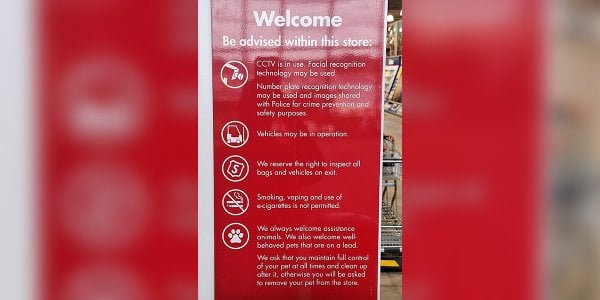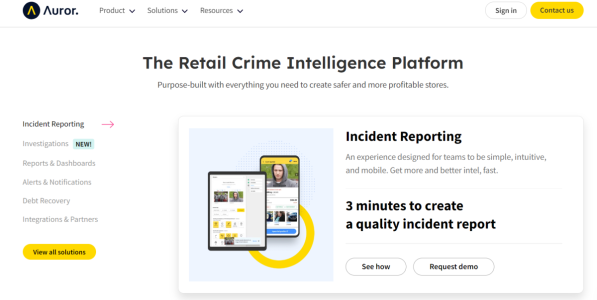Is your privacy at risk? CEO responds to fears over surveillance at Bunnings
It's a fact that, while there are a lot of conveniences when it comes to online shopping, there are privacy and security risks we must contend with as well.
One of the most pressing concerns is that of privacy interference, especially when technology begins to be used in areas considered untraditional and intrusive.
This has been the case with the news that major retailer Bunnings is using facial and plate-number recognition to attempt to ‘prevent crime before it happens’.
Bunnings put up signage last month that informed the customers of this security measure, stating that this technology ‘may be used and images shared with police for crime prevention and safety purposes’.
The move has sparked plenty of reactions, with social media users everywhere raising their voices and expressing privacy concerns.
‘Just a glimpse of Australia’s incoming dystopian police state,’ one social media user wrote.
‘Did they ever say how this is meant to work? Does this keep a record of people that steal or is it so the system can switch between cameras to follow a person of interest around the store or what?’ Another Reddit user commented.
Phil Thomson, the CEO and founder of crime intelligence platform Auror–which is being used by Bunnings as well as other retailers–believes that customers have nothing to fear.
But what is Auror?
It is a crime intelligence platform that is being used by 40 per cent of Australian retailers to aggregate data sources for the purpose of investigating crimes and preventing them from taking place. It monitors number plate data in real time, and it keeps the information for up to two months.
'We are a crime reporting platform, so after an event occurs like shoplifting or theft or fraud, a retail store worker will use this as their business tool to capture what’s happened,' Thomson reiterated.
'If you were an offender they would upload the video footage of what’s occurred as evidence. Then they have their own policies around things like CCTV footage, which does capture everyone who comes in before it’s deleted,' he added.
So, what about the privacy of customers who are not involved in any sort of criminal activity?
Thomson assured customers that this technology is 'not for someone who’s not been involved in a crime event'.
That said, concerns over privacy protection have been raised last month following a report that the Australian Federal Police (AFP) had stopped using it pending a review.
A Freedom Of Information (FOI) request exposed that more than 100 of AFP’s staff had used the platform without privacy or security considerations. A news outlet has obtained internal emails describing how the staff collected information from retailers that weren’t reported to the police and how they input their own information into the system without any guardrails for its use.
But the Auror CEO defended their technology, saying that his New Zealand-based firm had been ‘mischaracterised’ and ‘lumped in with different technologies’.
‘When we talk about preventing crime they take it to mean prediction, but what it means is allowing stores to know who’s offended in the area,’ Thomson explained.
‘We’re not predicting where they’re going to act, we’re just providing the information to the store network so the retailer can let other stores in the area know this crime group has just been in the area and who to look out for.’
‘If that vehicle arrives back at their store, who are the people who’ve been associated with that vehicle and if they’ve used a weapon in the past,’ he elaborated.
‘It changes the approach of the store manager to maybe not approach that person if they were violent in the past.’
He also admitted that while they ‘use some AI in data matching to help suggest if it’s the same offender to an investigator’, he assured that there’s always a ‘human reviewing those things’.
The Auror CEO also highlighted the benefits that the technology provides in preventing crime in retail stores.
‘In Australia, about $15 million a day is being stolen, it’s about $150 billion a year globally,’ he said.
He claimed: ‘Ten per cent of people are causing 60 per cent of the loss, and if you scale that up further [it’s 20 per cent causing 80 per cent]. The fact is those people are doing more than shoplifting, they’re generally involved in gangs, guns and drugs. They’re doing this as their job.’
By using Auror, they have proven that many of the cases involving retail crime have ‘the same people doing it in an organised, full-time nature, working together, usually targeting five to 10 stores’.
According to Thomson, some people are ‘given shopping lists–go out today and steal these things and we’ll pay you–others will only target particular items, which might be baby formula, red meat products or high-end power tools’.
‘It’s $1000 at a time, not stealing some sausages and bread for dinner. It’s not one tin of formula, it’s shipping off $300,000 worth overseas,’ he added.
However, even if the criminals have been apprehended, Thomson believes that ‘the implications through the justice systems aren’t that great’.
‘If they only get caught for one thing, a couple of hundred dollars, they might be given a slap on the wrist and get off. The core thing we’re doing is helping show that person hasn’t done one thing–they’ve done 10 to 20 things,’ Thomson explained.

What do you think of this new technology, members? Have you seen these changes or anything similar in your local retailers? Share your thoughts in the comments below!
One of the most pressing concerns is that of privacy interference, especially when technology begins to be used in areas considered untraditional and intrusive.
This has been the case with the news that major retailer Bunnings is using facial and plate-number recognition to attempt to ‘prevent crime before it happens’.
Bunnings put up signage last month that informed the customers of this security measure, stating that this technology ‘may be used and images shared with police for crime prevention and safety purposes’.
The move has sparked plenty of reactions, with social media users everywhere raising their voices and expressing privacy concerns.
‘Just a glimpse of Australia’s incoming dystopian police state,’ one social media user wrote.
‘Did they ever say how this is meant to work? Does this keep a record of people that steal or is it so the system can switch between cameras to follow a person of interest around the store or what?’ Another Reddit user commented.
Phil Thomson, the CEO and founder of crime intelligence platform Auror–which is being used by Bunnings as well as other retailers–believes that customers have nothing to fear.
But what is Auror?
It is a crime intelligence platform that is being used by 40 per cent of Australian retailers to aggregate data sources for the purpose of investigating crimes and preventing them from taking place. It monitors number plate data in real time, and it keeps the information for up to two months.
'We are a crime reporting platform, so after an event occurs like shoplifting or theft or fraud, a retail store worker will use this as their business tool to capture what’s happened,' Thomson reiterated.
'If you were an offender they would upload the video footage of what’s occurred as evidence. Then they have their own policies around things like CCTV footage, which does capture everyone who comes in before it’s deleted,' he added.
So, what about the privacy of customers who are not involved in any sort of criminal activity?
Thomson assured customers that this technology is 'not for someone who’s not been involved in a crime event'.
That said, concerns over privacy protection have been raised last month following a report that the Australian Federal Police (AFP) had stopped using it pending a review.
A Freedom Of Information (FOI) request exposed that more than 100 of AFP’s staff had used the platform without privacy or security considerations. A news outlet has obtained internal emails describing how the staff collected information from retailers that weren’t reported to the police and how they input their own information into the system without any guardrails for its use.
But the Auror CEO defended their technology, saying that his New Zealand-based firm had been ‘mischaracterised’ and ‘lumped in with different technologies’.
‘When we talk about preventing crime they take it to mean prediction, but what it means is allowing stores to know who’s offended in the area,’ Thomson explained.
‘We’re not predicting where they’re going to act, we’re just providing the information to the store network so the retailer can let other stores in the area know this crime group has just been in the area and who to look out for.’
‘If that vehicle arrives back at their store, who are the people who’ve been associated with that vehicle and if they’ve used a weapon in the past,’ he elaborated.
‘It changes the approach of the store manager to maybe not approach that person if they were violent in the past.’
He also admitted that while they ‘use some AI in data matching to help suggest if it’s the same offender to an investigator’, he assured that there’s always a ‘human reviewing those things’.
The Auror CEO also highlighted the benefits that the technology provides in preventing crime in retail stores.
‘In Australia, about $15 million a day is being stolen, it’s about $150 billion a year globally,’ he said.
He claimed: ‘Ten per cent of people are causing 60 per cent of the loss, and if you scale that up further [it’s 20 per cent causing 80 per cent]. The fact is those people are doing more than shoplifting, they’re generally involved in gangs, guns and drugs. They’re doing this as their job.’
By using Auror, they have proven that many of the cases involving retail crime have ‘the same people doing it in an organised, full-time nature, working together, usually targeting five to 10 stores’.
According to Thomson, some people are ‘given shopping lists–go out today and steal these things and we’ll pay you–others will only target particular items, which might be baby formula, red meat products or high-end power tools’.
‘It’s $1000 at a time, not stealing some sausages and bread for dinner. It’s not one tin of formula, it’s shipping off $300,000 worth overseas,’ he added.
However, even if the criminals have been apprehended, Thomson believes that ‘the implications through the justice systems aren’t that great’.
‘If they only get caught for one thing, a couple of hundred dollars, they might be given a slap on the wrist and get off. The core thing we’re doing is helping show that person hasn’t done one thing–they’ve done 10 to 20 things,’ Thomson explained.
Key Takeaways
- Auror, a crime intelligence platform used by retailers such as Woolworths and Bunnings, is facing questions about privacy concerns, particularly since it has been revealed that the Australian Federal Police (AFP) had stopped using the technology pending a review.
- Founder and CEO Phil Thomson insists Auror is just a reporting platform used after a crime event, adding that privacy remains a key concern in its operations.
- The platform is used by retailers to share evidence of a crime–including video footage and automatic number plate recognition–with police. Data is kept for up to two months for crime investigation and prevention purposes.
- Thomson assured the customers that this technology is 'not for someone who’s not been involved in a crime event’.
- According to Thomson, most retail crime is coordinated and often linked to organised crime, costing the Australian economy approximately $15 million per day.
What do you think of this new technology, members? Have you seen these changes or anything similar in your local retailers? Share your thoughts in the comments below!









